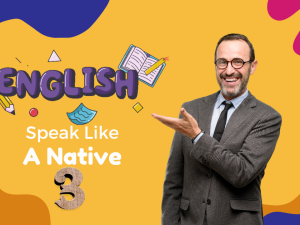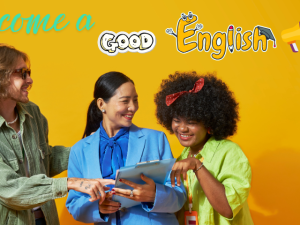Advanced English Level 6
- Description
- Curriculum
- Reviews
- Grade

Welcome to Advanced English Level 6, the pinnacle of our English language mastery series. This course is designed to elevate your command of English to a near-native level. It focuses on the subtleties and nuances of the language, including advanced grammar, sophisticated vocabulary, and intricate language structures. Through in-depth reading, writing, listening, and speaking activities, you’ll engage with complex texts and contexts, preparing you for any academic or professional challenge.
Course Objective: By the end of this course, learners will:
Achieve near-native fluency in English.
Master advanced grammatical structures and vocabulary.
Develop the ability to understand and use nuanced and idiomatic language.
Enhance their proficiency in academic and professional communication.
Strengthen their critical thinking and analytical skills through language.
Key Features:
Highly interactive lessons with real-world applications.
Instruction from educators with a deep understanding of advanced English.
Comprehensive assessments and personalized feedback.
Access to an extensive library of resources, including reading materials, practice exercises, and multimedia content.
Opportunities for live interaction, discussion, and debate with peers and instructors.
-
1Unit 1.1: Advanced Writing Techniques
-
2Discover more with this educational video.
-
3Review the video and give your answers.
-
4Practice this task to develop better comprehension skills
-
5Use this assignment as learning reinforcement.
-
6📖 The Psychology of Love: Attachment and Intimacy
-
7Subject: Love and Identity in Contemporary Literature ❤️🧠
-
8🎤 Advanced Speaking Test: Individual Presentation
-
9Unit 1.2: Presentations and Public Speaking
-
10Learn more by watching this explanatory video.
-
11Listen to the recording and respond.
-
12Do this exercise to improve your comprehension
-
13Use this assignment as learning reinforcement.
-
14📖 The Language of Love in Poetry and Prose
-
15🌟 Time for Reflection! 🌟
-
16🎤 Advanced Speaking Test: Individual Presentation
-
17Unit 1.3: Discussion and Debate
-
18Discover more with this educational video.
-
19Practice this task to develop better comprehension skills
-
20Pay attention to the recording and answer accordingly.
-
21Follow this activity to gain clarity.
-
22📖 The Sociology of Sports: Identity and Belonging
-
23🌿 Reflect on Nature’s Value 🌿
-
24🎤 Advanced Speaking Test: Individual Presentation
-
25Reflexive pronouns
Do you know how to use reflexive pronouns like myself, yourself or themselves? Test what you know with interactive exercises and read the explanation to help you.
-
26Find out more through this dynamic lesson video.
-
27Watch this video and answer the following questions.
-
28Work on this activity to expand your knowledge.
-
29Do this task to sharpen your skills.
-
30Reflexive Pronouns (Conversation)
-
31📖 Climate Change and Global Health
-
32🌆 Reflecting on Urbanization and Biodiversity 🌱
-
33🎤 Advanced Speaking Test: Individual Presentation
-
34Relative clauses: defining relative clauses
Do you know how to define who or what you are talking about using relative clauses? Test what you know with interactive exercises and read the explanation to help you.
-
35Let this video be your next learning step.
-
36Listen carefully and respond to the questions.
-
37Complete this task to enrich your understanding.
-
38Work on this activity to expand your knowledge.
-
39Relative Clauses – Defining Relative Clauses
-
40📖 The Moral Challenges of Cosmetic Surgery
-
41🌲 Reflect on Wilderness Preservation 🌍
-
42🎤 Advanced Speaking Test: Individual Presentation
-
43Relative clauses: non-defining relative clauses
Do you know how to give extra information about someone or something using relative clauses? Test what you know with interactive exercises and read the explanation to help you.
-
44Let this video be your next learning step.
-
45disavantag
-
46Do this task to sharpen your skills.
-
47Do this task to sharpen your skills.
-
48Relative clauses: non-defining relative clauses
-
49📖 The Role of Propaganda in World War II
-
50🌿 Reflect on Nature and Human Health 🌞
-
51🎤 Advanced Speaking Test: Individual Presentation
-
52Unit 3: 1. 📊 Analyzing and Synthesizing Information
-
53Watch this video to enhance your understanding of the topic.
-
54Watch this video and answer the following questions.
-
55Try this activity to sharpen your language abilities.
-
56Analyzing and Synthesizing Information
-
57📖 Innovation Management and Competitive Advantage
-
58🤖 Reflect on Technology and the Environment 🌍
-
59🎤 Advanced Speaking Test: Individual Presentation
-
60Unit 3.2: Problem-Solving Strategies
-
61Use this video to expand your knowledge on the subject.
-
62Play the audio and complete the task.
-
63Try this activity to sharpen your language abilities.
-
64🧩 Matching Activity: Solving a Problem Together
-
65📖 Business Ethics in Emerging Markets
-
66🏥 Reflect on Healthcare and Human Rights 🌍
-
67🎤 Advanced Speaking Test: Individual Presentation
-
68Unit 3.3: Persuasion and Influencing Others
-
69Watch this video to enhance your understanding of the topic.
-
70Listen carefully and respond to the questions.
-
71Practice this to strengthen your grammar and vocabulary.
-
72Activity: Persuasion and Influencing Others
-
73📖 Women in Leadership: Breaking the Glass Ceiling
-
74🧠 Reflect on Mental Health Programs in Schools 💬
-
75🎤 Advanced Speaking Test: Individual Presentation
-
76Unit 4.1: Complex Sentence Structures
-
77Dive into this video for more insights.
-
78Play the audio and complete the task.
-
79Practice this to strengthen your grammar and vocabulary.
-
80🎤 Short Speech: Love Is Blind
-
81📖 The Science of Habits and Change
-
82💰 Reflect on Saving vs. Investing 💡
-
83🎤 Advanced Speaking Test: Individual Presentation
-
84Unit 4.2: Stylistic Choices in Writing
-
85Watch this video to enhance your understanding of the topic.
-
86Listen carefully and respond to the questions.
-
87Go through this activity to polish your English.
-
88🎤 Short Speech: Money Talks
-
89📖 Religion and Social Justice Movements
-
90🌟 Reflect on Success and Wealth 💼💖
-
91🎤 Advanced Speaking Test: Individual Presentation
-
92Unit 4.3: Mastering Verb Tenses and Modality
-
93🎤 Speech Title: “Destiny Answers to Obedience” –Bishop David Oyedepo
-
94Go through this activity to polish your English.
-
95🎤 Short Speech: Money Can’t Buy Happiness
-
96📖 Ritual vs. Relationship: Understanding Faith Practices
-
97🔬✨ Reflect on Science and Religion: Conflict or Compatibility? 🙏🔭
-
98🎤 Advanced Speaking Test: Individual Presentation
-
99Unit 5.1: Literary Analysis
-
100Discover more with this educational video.
-
101Practice this task to develop better comprehension skills
-
102Pay attention to the recording and answer accordingly.
-
103📖 The Ethics of Cultural Tourism
-
104🌐 The Language Barrier: Obstacle or Opportunity? 🗣️✨
-
105Please complete this to aid your comprehension.
-
106🎤 Advanced Speaking Test: Class Debate/Panel Discussion
-
107Unit 5.2: Academic Reading and Synthesis
-
108Watch and learn more about this concept.
-
109Watch this video and answer the following questions.
-
110Complete the activity to enhance your understanding
-
111Tackle this activity to enhance your learning.
-
112📖 Nomadic Living and the Meaning of Home
-
113⚖️ Justice Delayed Is Justice Denied ⚖️
-
114🎤 Advanced Speaking Test: Class Debate/Panel Discussion
-
115Unit 5.3: Professional Document Analysis
-
116Use this video to expand your knowledge on the subject.
-
117Watch this video and answer the following questions.
-
118Review this exercise to reinforce your learning.
-
119Work on this assignment to reinforce your knowledge.
-
120📖 Human Rights in the Digital Age
-
121💰 Is Financial Independence Essential for Personal Freedom? 🕊️
-
122🎤 Advanced Speaking Test: Class Debate/Panel Discussion
-
123Unit 6.1: Socializing in English-Speaking Countries
-
124Watch and learn more about this concept.
-
125Listen to the recording and respond.
-
126Do this exercise to improve your comprehension
-
127Practice this task to develop better comprehension skills.
-
128📖 Building Trust in a Distrustful World
-
129🌅 Daily Rituals That Shape Character 💪✨
-
130🎤 Advanced Speaking Test: Class Presentation & Interactive Q&A
-
131Unit 6.2: Idioms, Phrasal Verbs, and Colloquial Language
-
132Watch this video to enhance your understanding of the topic.
-
133Listen to the recording and respond.
-
134Do this exercise carefully and respond to the questions.
-
135Work on this assignment to reinforce your knowledge.
-
136📖 Facing Change Without Losing Yourself
-
137🏠 Moving Away from Home: The Emotional Cost 💔✨
-
138🎤 Advanced Speaking Test: Personal Reflection & Class Interaction
-
139Unit 6.3: Understanding Humor and Sarcasm
-
140Check out this video to reinforce your learning.
-
141Use this video to expand your knowledge on the subject.
-
142Play the audio and complete the task.
-
143Use this task to deepen your understanding
-
144Work on this assignment to reinforce your knowledge.
-
145🤝 Taking Responsibility Without Shame 💡✨
-
146📖 Parenting While Learning to Grow Yourself
-
147🎤 Advanced Speaking Test: Individual Presentation & Interactive Q&A
-
148Unit 7.1: Writing Professional Documents
-
149Use this video to expand your knowledge on the subject
-
150View this video to gain a deeper perspective.
-
151Listen carefully and respond to the questions.
-
152Solve these problems to strengthen your grasp
-
153Work on this assignment to reinforce your knowledge.
-
154📖 Doing the Right Thing in Difficult Moments
-
155🤥 Small Lies and Their Long-Term Effects ⏳✨
-
156🎤 Advanced Speaking Test: Personal Reflection & Class Discussion
-
157Unit 7.2: Negotiation and Persuasion Techniques
-
158Use this video to expand your knowledge on the subject
-
159Watch this video and answer the following questions.
-
160Practice this task to develop better comprehension skills
-
161📖 Living by Principle in a Practical World
-
162⚖️ When Convenience Conflicts with Conscience 🧠✨
-
163🎤 Advanced Speaking Test: Personal Presentation & Class Discussion
-
164Work on this assignment to reinforce your knowledge.
-
165Unit 7.3: Networking and Professional Etiquette
-
166Dive into this video for more insights.
-
167Practice this task to develop better comprehension skills
-
168Do this exercise to improve your comprehension.
-
169📖 Speaking Up When It’s Unpopular
-
170🗣️ Assertiveness Without Aggression 💬🤝
-
171🎤 Advanced Speaking Test: Individual Speech & Q&A Session
-
172Complete this task to deepen your understanding.
-
173Unit 8.1: Communicating Effectively Online
-
174video
-
175Practice this to strengthen your grammar and vocabulary.
-
176Work on this assignment to reinforce your knowledge.
-
177📖 The Joy of Creating for No Reward
-
178🎨 The Discipline Behind Creative Freedom 🧠🛠️
-
179🎤 Advanced Speaking Test: Personal Speech & Class Discussion
-
180Unit 8.2: Using Technology for Research and Presentations
-
181Use this video to expand your knowledge on the subject.
-
182Watch this video and answer the following questions.
-
183Do this task to enhance your English proficiency.
-
184Work on this assignment to reinforce your knowledge.
-
185📖 Facing Creative Block and Moving Forward
-
186💭 What If Your Dream Doesn’t Work Out? 🌧️➡️🌤️
-
187🎤 Advanced Speaking Test: Individual Presentation & Q&A
-
188Unit 8.3: Digital Collaboration and Problem-Solving
-
189Watch this video to enhance your understanding of the topic.
-
190Use this video to expand your knowledge on the subject.
-
191Dive into this video for more insights.
-
192Check out this video to reinforce your learning.
-
193Play the audio and complete the task.
-
194Work on this assignment to reinforce your knowledge.
-
195📖 Every Day Is a Chance to Begin Again
-
196💼 The Power of Side Hustles 💡🔥
-
197🎤 Advanced Speaking Test: Individual Presentation & Class Q&A
-
198🎯 Unit :9.1. Lesson: Reported Speech – Questions ❓➡️🗣️
Do you know how to report a question that somebody asked? Test what you know with interactive exercises and read the explanation to help you.
-
199Watch this video to enhance your understanding of the topic.
-
200Complete this task to enrich your understanding.
-
201Practice this to gain deeper insight.
-
202Work on this assignment to reinforce your knowledge.
-
203📖 Gender Roles in Ancient Civilizations
-
204🌍 Reflect on Climate Change and Nature 🌱
-
205🎤 Advanced Speaking Test: Individual Presentation
-
206🎯 Unit 9:2. Lesson: Reported Speech – Reporting Verbs 🗣️➡️📋
Do you know how to tell someone what another person said using reporting verbs? Test what you know with interactive exercises and read the explanation to help you.
-
207Use this video to expand your knowledge on the subject.
-
208Listen carefully and respond to the questions.
-
209Apply reported speech reporting
-
210Understanding reported speech reporting
-
211Work on this assignment to reinforce your knowledge.
-
212📖 Reading Text: The Power of Reporting Verbs in Reported Speech 🗣️➡️📄
-
213🎯 Lesson Focus: Reported Speech — Using Different Reporting Verbs
-
214✍️ Writing Test: Reported Speech & Reporting Verbs 🗣️🔄
-
215🎯Unit 9:3. Lesson: Reported Speech – Statements 🗨️➡️📝
Do you know how to report what somebody else said? Test what you know with interactive exercises and read the explanation to help you.
-
216Play the audio and complete the task.
-
217Test your knowledge of reported speech of statement
-
218Apply reported speech statement
-
219📖 Reading Text: Mastering Reported Speech: Statements 🗣️➡️📝
-
220🎯 Lesson Focus: Reported Speech — Reporting Statements
-
221✍️ Writing Test: Reported Speech – Statements 🗣️➡️📝
-
222🎯 Unit 10: 1. Lesson: Verbs Followed by '-ing' or Infinitive — Changing Meaning! 🔄🧠
Do you know the difference between stop doing something and stop to do something? Test what you know with interactive exercises and read the explanation to help you.
-
223verbs followed by '' ing'' Mastery
-
224Test your knowledge of the verb followed by ''ing''
-
225✍️Writing Test: Verbs Followed by ‘-ing’ or Infinitive to Change Meaning 🧠🔄
-
226🎯 Lesson Focus: Verbs followed by -ing or infinitive to change meaning
-
227📖 Reading Text: How Verbs Change Meaning with -ing or Infinitive Forms 🔄
-
228🌟Unit 10.2 : Using “As” vs. “Like” 🧩🧑🏫
Do you know how to use like and as? Test what you know with interactive exercises and read the explanation to help you.
-
229Watch this video to enhance your understanding of the topic.
-
230Listen carefully and respond to the questions.
-
231Mastery of the word enough
-
232Application of the word ''as'' and ''like''
-
233Mastery of the word '' if only '' and ''wish''
-
234📖 Reading Text: Speaking As You Should, Not Like Everyone Else 🗣️💬
-
235🎯 Lesson Focus: Using “As” vs. “Like” in presentations
-
236✍️ Writing Test: Using “As” vs. “Like” 🧠🔤
-
237Unit : 10.3" Using 'enough"
Do you know how to use the word enough? Test what you know with interactive exercises and read the explanation to help you.
-
238Listen and write your responses.
-
239Test your knowledge of using enough
-
240📖 Reading Text: Is Progress Always Enough? 🌍✨
-
241🎯 Using "enough" in advanced speaking
-
242✍️ Writing Test 🧠🌍






